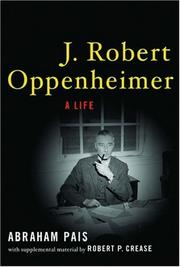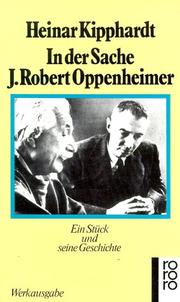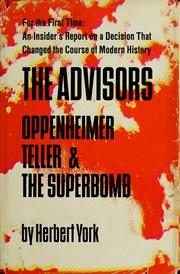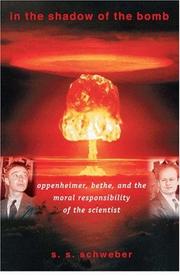| Listing 1 - 10 of 14 | << page >> |
Sort by
|
Book
Year: 1921 Publisher: Münster : Löwenstein,
Abstract | Keywords | Export | Availability | Bookmark
 Loading...
Loading...Choose an application
- Reference Manager
- EndNote
- RefWorks (Direct export to RefWorks)
Dühren, Eugen, --- Hertzka, Theodor, --- Oppenheimer, Robert,

ISBN: 3486886231 Year: 1988 Publisher: München Oldenbourg
Abstract | Keywords | Export | Availability | Bookmark
 Loading...
Loading...Choose an application
- Reference Manager
- EndNote
- RefWorks (Direct export to RefWorks)
Kipphardt, Heinar, --- Oppenheimer, J. Robert, --- Ou-pên-hai-mo, --- Oppenheimer, Robert, --- Oppenheimer, Julius Robert, --- Drama. --- Kipphardt, Heinar

ISBN: 0195166736 9780195166736 9780195347227 0195347226 1280655461 9781280655463 1435614143 0199883203 0197709354 9781435614147 Year: 2006 Publisher: Oxford ; New York : Oxford University Press,
Abstract | Keywords | Export | Availability | Bookmark
 Loading...
Loading...Choose an application
- Reference Manager
- EndNote
- RefWorks (Direct export to RefWorks)
An illuminating portrait of J. Robert Oppenheimer chronicles the story of one of the most charismatic and enigmatic figures of modern physics, from his precocious youth to his seminal role in developing the first atomic bomb, and beyond.
Oppenheimer, Julius Robert, --- Atomic bomb --- Physicists --- History. --- Oppenheimer, J. Robert --- United States --- History --- Biography --- Oppenheimer, J. Robert, --- Ou-pên-hai-mo, --- Oppenheimer, Robert,

ISBN: 3499121115 Year: 1987 Publisher: Reinbek bei Hamburg Rowohlt
Abstract | Keywords | Export | Availability | Bookmark
 Loading...
Loading...Choose an application
- Reference Manager
- EndNote
- RefWorks (Direct export to RefWorks)
Oppenheimer, J. Robert, --- Kipphardt, Heinar, --- Drama. --- Oppenheimer, J. Robert --- -Kipphardt, Heinar --- Ou-pên-hai-mo, --- Oppenheimer, Robert, --- Oppenheimer, Julius Robert,
Book
ISBN: 9789814656740 9789814656733 9789814656764 9789814656757 9814656755 9814656739 9814656747 Year: 2016 Publisher: Singapore Hackensack, N.J.
Abstract | Keywords | Export | Availability | Bookmark
 Loading...
Loading...Choose an application
- Reference Manager
- EndNote
- RefWorks (Direct export to RefWorks)
The book recovers and reconstructs what Oppenheimer said and wrote during the 1940s, 50s and 60s (i.e., his hope and vision) with the goal of identifying what might be of general philosophical interest today. It considers not only Oppenheimer's thought, but also his life using philosophical ideas developed by contemporary philosophers.In addition, to deepen and broaden the discussion and demonstrate the relevance of Oppenheimer's vision for the present, the author analyzes his views using contemporary international relations theory with a special emphasis on nuclear nonproliferation and disarmament. This examination reveals ways in which Oppenheimer's reasoning was prescient of current work being carried out to control, and possibly move beyond, the nuclear revolution.
Philosophy, Modern --- Nuclear nonproliferation --- Physicists --- Philosophie --- Non-prolifération nucléaire --- Physiciens --- International cooperation. --- Coopération internationale. --- Oppenheimer, J. Robert, --- Ou-pên-hai-mo, --- Oppenheimer, Robert, --- Oppenheimer, Julius Robert,
Book
ISBN: 9812700935 9789812700933 Year: 2006 Publisher: Hackensack, N.J. World Scientific
Abstract | Keywords | Export | Availability | Bookmark
 Loading...
Loading...Choose an application
- Reference Manager
- EndNote
- RefWorks (Direct export to RefWorks)
2004 marked the centennial of the birth of J Robert Oppenheimer, and brought historians and scholars, former students, nuclear physicists, and politicians together to celebrate this event. Oppenheimer's life and work became central to 20th century history as he spearheaded the development of the atomic bomb that ended World War II. This book provides a spectrum of interpretations of Oppenheimer's life and scientific achievements. It approaches the extraordinary scientist and teacher from many perspectives, chronicling the years from his boyhood through his role as director of the Los Alamos Na
Atomic bomb --- History. --- Oppenheimer, J. Robert, --- Ou-pên-hai-mo, --- Oppenheimer, Robert, --- Oppenheimer, Julius Robert, --- Manhattan Project (U.S.) --- United States.

ISBN: 0791481638 1429411856 9781429411851 9780791481639 0791467813 9780791467817 Year: 2006 Publisher: Albany : State University of New York Press,
Abstract | Keywords | Export | Availability | Bookmark
 Loading...
Loading...Choose an application
- Reference Manager
- EndNote
- RefWorks (Direct export to RefWorks)
In 1942, J. Robert Oppenheimer accepted the leadership of the Manhattan Project at the Los Alamos Laboratory, which produced the first atomic bomb three years later. This book examines the ethics of Oppenheimer's choice to take that job and our judgment of his acceptance, leading to the larger question of the meaning of moral judgment itself. Through an analysis of Oppenheimer's choice, Richard Mason explores questions of responsibility, the justification for the pursuit of scientific curiosity, the purity of research, and many other topics of interest in scientific ethics. This unique look at one man's choice brings out the necessary step from personal detail to abstract reflection—it may be easy to praise or condemn Oppenheimer's choice, but less easy to justify our praise or condemnation. Oppenheimer's Choice establishes the possibility of this kind of moral philosophy—neither "applied" nor "practical" ethics, but instead a sustained concentration on a single choice, and what it means.
Ethics. --- Technology --- Deontology --- Ethics, Primitive --- Ethology --- Moral philosophy --- Morality --- Morals --- Philosophy, Moral --- Science, Moral --- Philosophy --- Values --- Technology and ethics --- Moral and ethical aspects. --- Oppenheimer, J. Robert, --- Ou-pên-hai-mo, --- Oppenheimer, Robert, --- Oppenheimer, Julius Robert,
Book
ISBN: 9050187099 Year: 2005 Publisher: Amsterdam Balans
Abstract | Keywords | Export | Availability | Bookmark
 Loading...
Loading...Choose an application
- Reference Manager
- EndNote
- RefWorks (Direct export to RefWorks)
Philosophy and psychology of culture --- History as a science --- Science and civilization --- Science et civilisation --- Wetenschap en beschaving --- Boltzmann, Ludwig --- Cheyne, George --- Descartes, René, --- Greenberg, Daniel --- Halley, Edmund --- Harrison, John K. --- Hooke, Robert --- Loomis, Alfred Lee --- Maxwell, James Clerk --- Mendelejev, Dmitri --- Mullis, Kary --- Newton, Isaac --- Oppenheimer, Robert --- Priestley, Joseph --- Sloane, Hans --- Teller, Edward --- Volta, Alessandro --- Wren, Christopher --- Boltzmann, Ludwig. --- Cheyne, George. --- Greenberg, Daniel. --- Halley, Edmund. --- Hooke, Robert. --- Loomis, Alfred Lee. --- Maxwell, James Clerk. --- Mendelejev, Dmitri. --- Mullis, Kary. --- Newton, Isaac, --- Oppenheimer, Robert. --- Priestley, Joseph, --- Sloane, Hans. --- Teller, Edward. --- Volta, Alessandro. --- Wren, Christopher. --- Maxwell, James Clerk, --- Volta, Alexandre, --- 378.4 --- 378.4 Universiteiten --- Universiteiten

ISBN: 0716707187 Year: 1976 Publisher: San Francisco (Calif.): Freeman
Abstract | Keywords | Export | Availability | Bookmark
 Loading...
Loading...Choose an application
- Reference Manager
- EndNote
- RefWorks (Direct export to RefWorks)
History of physics --- Polemology --- Oppenheimer, J. Robert --- Teller, E. --- Atomic bomb --- -Hydrogen bomb --- -H-bomb --- Nuclear weapons --- A-bomb --- Atom bomb --- Bombs --- History --- Teller, Edward --- United States --- Military policy. --- Hydrogen bomb --- History. --- Oppenheimer, J. Robert, --- Teller, Edward, --- -History --- H-bomb --- Teller, Ede, --- Ou-pên-hai-mo, --- Oppenheimer, Robert, --- Oppenheimer, Julius Robert,

ISBN: 0691127859 1306046173 0691049890 1400849497 9781400849499 9780691127859 Year: 2007 Publisher: Princeton, N.J. Woodstock
Abstract | Keywords | Export | Availability | Bookmark
 Loading...
Loading...Choose an application
- Reference Manager
- EndNote
- RefWorks (Direct export to RefWorks)
In the Shadow of the Bomb narrates how two charismatic, exceptionally talented physicists--J. Robert Oppenheimer and Hans A. Bethe--came to terms with the nuclear weapons they helped to create. In 1945, the United States dropped the bomb, and physicists were forced to contemplate disquieting questions about their roles and responsibilities. When the Cold War followed, they were confronted with political demands for their loyalty and McCarthyism's threats to academic freedom. By examining how Oppenheimer and Bethe--two men with similar backgrounds but divergent aspirations and characters--struggled with these moral dilemmas, one of our foremost historians of physics tells the story of modern physics, the development of atomic weapons, and the Cold War. Oppenheimer and Bethe led parallel lives. Both received liberal educations that emphasized moral as well as intellectual growth. Both were outstanding theoreticians who worked on the atom bomb at Los Alamos. Both advised the government on nuclear issues, and both resisted the development of the hydrogen bomb. Both were, in their youth, sympathetic to liberal causes, and both were later called to defend the United States against Soviet communism and colleagues against anti-Communist crusaders. Finally, both prized scientific community as a salve to the apparent failure of Enlightenment values. Yet, their responses to the use of the atom bomb, the testing of the hydrogen bomb, and the treachery of domestic politics differed markedly. Bethe, who drew confidence from scientific achievement and integration into the physics community, preserved a deep integrity. By accepting a modest role, he continued to influence policy and contributed to the nuclear test ban treaty of 1963. In contrast, Oppenheimer first embodied a new scientific persona--the scientist who creates knowledge and technology affecting all humanity and boldly addresses their impact--and then could not carry its burden. His desire to retain insider status, combined with his isolation from creative work and collegial scientific community, led him to compromise principles and, ironically, to lose prestige and fall victim to other insiders. Schweber draws on his vast knowledge of science and its history--in addition to his unique access to the personalities involved--to tell a tale of two men that will enthrall readers interested in science, history, and the lives and minds of great thinkers.
Atomic bomb --- Nuclear physicists --- Oppenheimer, J. Robert, --- Bethe, Hans A. --- A-bomb --- Atom bomb --- Bethe, H. A. --- Bete, G., --- Ou-pên-hai-mo, --- Oppenheimer, Robert, --- Oppenheimer, Julius Robert, --- Physicists --- Bombs --- Nuclear weapons --- Moral and ethical aspects --- Oppenheimer, J. Robert --- Bethe, Hans Albrecht --- United States --- Nuclear physics --- Biography
| Listing 1 - 10 of 14 | << page >> |
Sort by
|

 Search
Search Feedback
Feedback About UniCat
About UniCat  Help
Help News
News